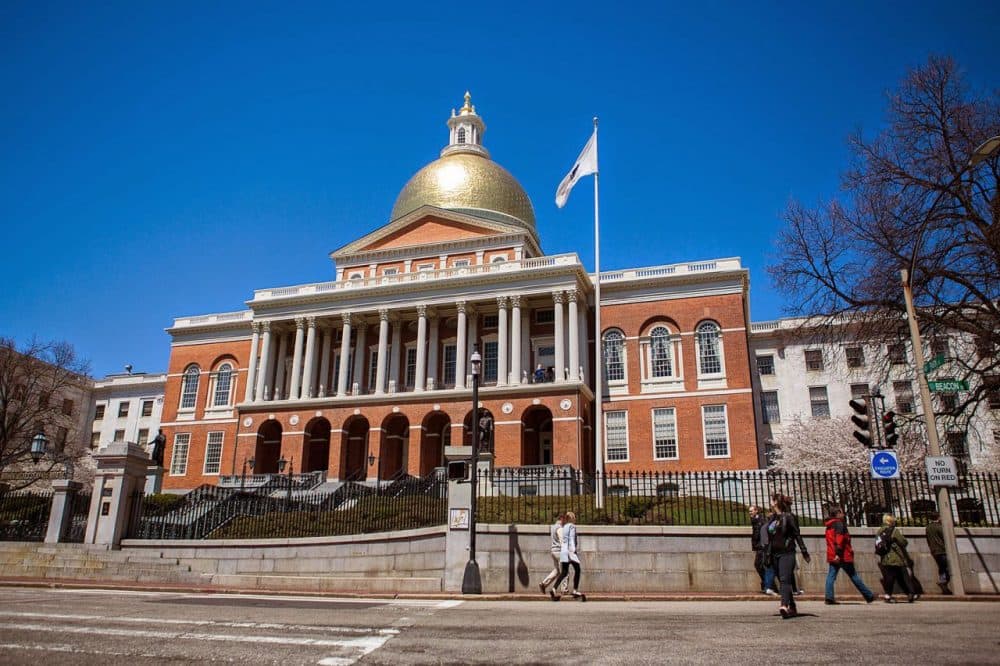Advertisement
Mass. Legislators Give First Round Approval To Millionaires' Tax

The Constitutional Convention advanced the 4 percent millionaires' tax with a vote of 135-57 Wednesday. Now, it must be approved in the 2017-'18 session before going to voters.
State lawmakers are expected to soon take a significant step toward changing Massachusetts' 236-year-old constitution — and toward implementing a millionaires' tax.
Meeting jointly in a Constitutional Convention on Wednesday, legislators will be asked to decide if an individual’s earnings above $1 million a year should be subject to an additional 4 percent tax. The revenue from that tax would be loosely earmarked for education and transportation.
An amendment to the state's constitution is necessary in this case, however, because it currently prohibits a graduated income tax.
What It Takes To Change The State's Constitution
The framers of the state constitution made it difficult — though not impossible — to amend the document. It has been 16 years since a change has been made.
Unlike the state’s general laws — which are changed through votes by the state's House and Senate and then signed by the governor — a constitutional amendment has a more complex path to fruition.
Any constitutional amendment must be approved by the Legislature meeting in joint session in two consecutive biennial sessions. Once it gains those two approvals, the matter is then placed before voters in a referendum.
This will be the first time the millionaires' tax issue comes before the Constitutional Convention. If it passes — as is expected — it will need a second round of approval by the Legislature sometime during the 2017-2018 legislative session before it can be placed on the 2018 ballot.
One unusual caveat to this particular constitutional amendment is that only 50 of the state’s 200 legislators have to agree to it.
Advertisement
"The reason why the bar is low is because it has gone through a more extensive process," said Senate Clerk Bill Welch, who serves as the Con-Con's parliamentarian. "It has gained the approval of a large number of the citizens of Massachusetts, so it’s a little outside the legislative agenda. It has a different bar for legislators, because the people have spoken and it would take a greater vote for them not to proceed to the next step."
Supporters calling themselves the Raise Up Coalition gathered close to 157,000 signatures last fall in order to place the amendment before the Constitutional Convention. That was more than double the 64,750 minimum signatures that were required.
While the bar for passage is low, the threshold for making any changes to the constitutional amendment is high. A super-majority -- three quarters of the members present — are needed to approve any changes that are proposed to the language of the constitutional amendment.
That doesn't mean they won't be proposed. Fifteen changes, offered mostly by Republicans against the millionaires' tax, will be up for debate.
Republican Bruce Tarr, the Senate minority leader, is backing many of them. "Fiscal discipline and trying to have a fair tax rate should be the things we're talking about, as opposed to going down the path of a graduated income tax that many of its proponents have not been able to secure either at the ballot box, or in this building," said Tarr.
Spirited debate on the merits of the amendment is anticipated. State Rep. Jay Kaufman, a Lexington Democrat, is the House chairman of the Legislature's Revenue Committee, and he predicts the constitutional amendment will get more than double the needed 50 votes. He also said he believes the proposed changes to the amendment will not fly for several reasons.
"[For] one, substantively, I don't think they should, and secondly, it would violate the spirit of an initiative petition," said Kaufman. "This is coming to us as a proposal from folks in the field. The Raise Up Coalition has raised the issue. They have collected the signatures. They are opposed to these amendments. It is our job to put their proposal before the people in 2018."
Kaufman expects if passed, the millionaires' tax would bring in an extra $2 billion. But, with the monies loosely earmarked for education and transportation spending, opponents fear the Legislature would find ways to spend it elsewhere.
While proposals for a form of graduated income tax have been defeated by voters five times since 1962, a WBUR poll conducted in April, along with a more recent poll conducted for the Boston Globe, show more than 70 percent of Massachusetts voters support the millionaires' tax.
This article was originally published on May 18, 2016.
This segment aired on May 18, 2016.
